
Dance music fans have always sought the records their favourite DJs are playing, but in recent years the hunt for — and provision of — Track IDs has become an increasingly pervasive and at times contentious subject in the scene. With an ecosystem of online communities, websites and apps dedicated to identifying tracks in sets and mixes, and even digging for music on listeners’ behalf, debate around the issue remains heated, with questions around credit and payment for producers, secondary markets, and authentic DJ culture arising again and again. Henry Ivry digs in.
It’s 10:30am on a Sunday in 2014. I’m swaying to a pad-heavy house track delivered by Texan DJ Willie Burns as the morning light glistens through the faux-stained glass that looks over the open air dancefloor of the now-shuttered club, Griessmuehle. It’s that magical time in Berlin when the crowd is transitioning from the late night crew to the fresh-faced punters gearing up for the day. Burns clocks the palpable shift in energy and drops a swung piece of deep house with a skittering arpeggio that sounds like metallic worms finding the first ray of sun in the spring. I subtly take a short ten second video of the track and, after he mixes out, head to the bathroom to upload the video to the Facebook group Identification of Music with the caption: “Willie Burns at Mother’s Finest — Track ID?”
I head back to the dancefloor and within five minutes, my phone starts vibrating with a Facebook notification. “Absolute classic. ‘A1’ from Chez Damier and Stacey Pullen’s ‘Forever Monna’.” Later that day, after travelling home, I look the track up online and, sure enough, that’s the one. After basking in its melancholy chord emotion once again, I head over to Discogs and cop it for £15.
Looking back, this all feels vaguely utopian. Social media had ensconced itself in the world of clubbing, but this was before terms like ‘Business Techno’ and ‘Instagram DJ’ had entered the cultural lexicon — and just a few months before we’d all learn about Cambridge Analytica and Nick Srnicek would publish Platform Capitalism. The fact that this music was being unearthed through these tools felt, if not exactly radical, then at least democratic. They shone a light on forgotten corners of dance music ephemera while acting as a rebuke to the era when DJs would black out artist information on white labels with permanent markers to keep their secret weapons just that.
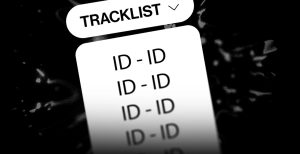
In the years since, the conversation has shifted. There are now countless YouTube channels and Instagram accounts dedicated to obscure dance music. There are sites like TrackID.net and the recently revived MixesDB that offer tracklists compiled by users, AI and Shazam that can tell you exactly what Helena Hauff played at Berghain last weekend or what Four Tet played on Rinse FM in 2016. There are also now apps that can go through Discogs on your behalf to find old records. The very term ‘ID’ — which once felt like an in-crowd calling card — has been appropriated by EDM social media sites like 1001Tracklists to describe an artist playing any unreleased song; it can be spotted on cardboard cut-outs held aloft by drunk lads at festivals up and down the Adriatic.
The hunt for – and provision of – unknown Track IDs has become an increasingly pervasive part of the dance music economy. And with that, a whole ecosystem of websites, DJs, and communities has developed to respond to our shared need to identify and collect music. But with that comes an increasing set of questions: do DJs need to share their tracks? Is maintaining a little mystery still an important part of DJ culture? Is that secrecy ever justified when producers can end up uncredited and unpaid? In the secondary market created by Track ID culture, who truly benefits? Does it matter if you have the same records as Lena Wilikens or Madam X if you can’t DJ like them? We caught up some of the people whose work touches on this nebulous corner of nightlife to figure out what the status of Track IDs are halfway through the third decade of the 21st century.
One issue that has dominated the track ID conversation is a tension between the idea that being a DJ means spending endless hours digging for music and the idea that DJing is about sharing music with others. Cooke, who did not want to give their full name and runs an Instagram account called NiceTuna dedicated to sharing rare tracks from the ’90s and early ’00s, provides a helpful gloss on this long-running debate.
“On one hand, I completely understand why a DJ might choose to keep certain tracks to themselves — especially if it’s a rare or unique find unearthed through hours of digging,” Cooke explains. “There’s a sense of pride in uncovering something special and wanting to preserve its exclusivity. On the other hand, I’ve also seen many DJs openly share details about the music they play, which I think is fantastic. It not only gives credit where it’s due but also helps shine a light on the producers and artists behind the tracks, particularly when it comes to new music. Sharing these discoveries ensures that creators receive the recognition they truly deserve.”

“On one hand, I love the mystery but […] tunes are there to be shared so I’ll always try and free up the ID — it’s just whether or not you can actually get your hands on it.” – Dr. Dubplate
Cooke highlights that DJing is, for both the pros and the living room hobbyists, all about playing the music of other people, and this comes with a certain amount of responsibility to share whose music you are playing. When DJs don’t share music, the artists who make these tracks aren’t getting social or financial recognition for their work. The question of who is receiving money for music is a recurring issue that that came to a boiling point with the recent closure of Aslice.
It is a long running debate that has been particularly acute in two distinct corners of clubland. First, there are the so-called “diggers” that Cooke is describing, the sort of people that flock to see DJs like Zip and Vera play week in and week out and expect to hear unfamiliar bombs in their sets. There is a tendency in this world to value being the first and only person to have a certain track. As Ed Lloyd, who worked for the spin-off company that emerged from the Identification of Music Facebook group puts it: “ID culture has put a premium on being the first to play a particular track, which in turn you could argue has made the entire scene ‘cliqueier’, as tracks often circulate first and foremost within tight-knit groups of DJs and producers.”
But it isn’t just in the world of ’90s minimal house cuts where this insularity operates. It’s also a key feature of the UK hardcore continuum and can be traced back to the dubplate culture that was spawned alongside jungle, garage, dubstep, and grime. Dr. Dubplate, who runs the label ec2a and whose very name hints at this history, explains how hoarding tracks was not just incidental, but a central part of the culture at large. “I come from the ultimate gatekeeper era and there’s still tunes I haven’t found to this day from old SWAMP81 Rinse FM shows from, like, 2013/14. On one hand, I love the mystery but […] tunes are there to be shared so I’ll always try and free up the ID — it’s just whether or not you can actually get your hands on it. I think the culture is wicked, people love the music and are eager to find out what tracks are called and who made them.”
While Dubplate acknowledges that this was a rite of passage, he also points to how this, again, continues to winnow the type of people who have access to music and, importantly, keeps money out of the pockets of producers. In the world of dubstep and garage that Dubplate operates in, this can certainly be the case as many of these tracks are forthcoming and unreleased material that can be used to build some hype. Joseph Kemp, AKA DJ Cosworth who runs the HARDLINE label, points this out to me: “It’s the same thing as limited stock, sell out culture in fashion. People want the limited thing at that time that others don’t. [It] doesn’t matter if you’re playing a show in a club, on radio, or in your yard with your mates, playing that unreleased tune is a nice nod to being like: ‘I have this tune’. I remember getting sent my tunes which were unreleased and I was so giddy — being like, ‘No way. This is what this artist is working on and only a few people know about it.’”

“ID culture has put a premium on being the first to play a particular track, which in turn you could argue has made the entire scene ‘cliqueier’, as tracks often circulate first and foremost within tight-knit groups of DJs and producers.” – Ed Lloyd
Having an unreleased record in your bag is a flex and can, of course, be a big boost for producers when the release eventually sees the light of day. This, in theory, sounds like the horizon everyone wants to be moving towards. But it doesn’t operate that way in all corners of the larger dance music scene. Often the tracks being identified are old ’90s gems that point to a structural problem at play with that redistribution of wealth. These tunes aren’t widely available on platforms like Bandcamp or Beatport and, instead, drive the secondary market on Discogs into a tailspin.
“Contemporary society prizes scarcity and consumption,” the DJ and producer Ben Block, who started running MixesDB 2 after the original site went down, explains. “This impacts dance music just like it does any other industry, and has made rare vinyl records into highly commoditised, speculative items. Furthermore, in tightly-contained scenes (like underground dance music), ownership of these objects can confer a type of status and knowledge on the owner.”
Block is describing how sharing IDs doesn’t necessarily drive sharing revenue. Instead, it continues to shore up the boundaries around who can afford access to music. Cooke sees the exact same problem at play: “My friends and I often joke that if a record’s price skyrockets, it’s probably because [Francesco] Del Garda dropped it at Houghton, and it ended up on the Identification of Music group. Unfortunately, this isn’t far from the reality of the record game today. The increased visibility can make it much harder to get your hands on those golden records.”
Mike Roter AKA DJ Bigos, voices a similar frustration, describing his outrage at seeing Joy Orbison’s ‘Flight FM’ — released earlier this year — fetching over £100 after getting some initial airtime by big name DJs. Roter’s insight is particularly valuable as he is a key node of this particular world. “DJ Bigos” is a familiar name to anyone who has listened to a SoundCloud mix in the past decade. His name is almost always in the comments, providing detailed tracklists of the mix you’re listening to.
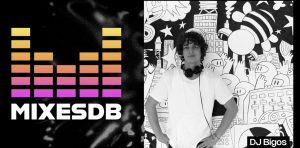
When I pose the question as to why he started doing this, he explains to me, “I started collecting IDs back in 2015, digging through SoundCloud mixes and spending a lot of time searching for tracks. By 2016, I began commenting on and uploading IDs myself. Honestly, I got into this because I was frustrated that so many DJs wouldn’t share their tracklists — especially when there’s a track in a mix you need to find so badly.”
Roter is gesturing towards that ineffable feeling that’ll be familiar to many. You’ve got a mix playing in the background while you’re cooking or working. All the sudden some serotonin-releasing arpeggio twinkles across the stereo or a bassline so meaty your heart rattles, snakes in. You need to know the ID. Roter went further and started actually doing the work of helping fill in the blanks.
This work, like the whole vexed debate in general, has not been without its detractors. He recalls a well-known DJ yelling at him for IDing tracks in a Dekmantel Mix, and another deleting his comments at one point. “Moments like these remind me that not everyone feels the same way about sharing IDs, and that’s okay,” he explains. “It’s all part of the conversation around music and community.”
While Roter tries to take a positive spin on this, it’s easy to see that there is still a certain amount of toxicity that bubbles not far beneath the surface when it comes to actually sharing music. From DJs holding back “secret weapons” to Discogs sharks, this has created its own separate economy where now you can find people who will actually dig music for you.z
Berlin Track Servant is one of these services. The Instagram account offers a daily update of ’90s and early ’00s house and techno — the classic fodder of the diggers world. But for a monthly fee, you can receive three personalised records that the people behind the account have curated for you. At one level, this seems somewhat insidious. We’ve now reached a place where you can pay someone to do the labour of finding records and curating your own taste for you. At another level, though, this is a logical next step.
Speaking to the people behind the account, they explain that their whole ethos is about “decentralising music and inspiring people to dig deeper into music”. More than just acting as a surrogate tastemaker, services like Berlin Track Servant see themselves as a jumping off point into a deeper world of music.
When I ask how they got into this, a founder explains: “I started the digging service for two reasons: firstly, many people asked me if they could pay me money to provide them rips of tracks I posted, but for me this feels like taking the soul out of the game. Secondly, I really appreciated the […] conversations I had with people who regularly replied to my stories and vice-versa, so getting in touch with like-minded people by providing personally curated record-packages felt like the logical consequence and symbiosis of both streams.”
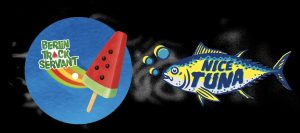
While it’s easy to scoff at this idea (and, indeed, just about everyone I mention this to do does just that. As Block says, “Digger services — good God! I think someone has lost the plot of DJing entirely if they use that”). Is something like a digging service all that different from hunting down each record from a DJ Bigos tracklist? All of this seems to return to that question that underpins ID culture more generally: what happens once you actually get one of these sought after tracks?
“If someone is only playing out tracks that they have found from other DJs tracklists, I think the ultimate harm is to themself more than anyone else,” Block explains to me. “Who would even know if a DJ is only playing music that they found from other DJs? Who in the crowd would care, especially if they are enjoying themselves? Relying on only a single information input (like tracklists) is not going to lead to a well-rounded understanding of music and its history/context. Searching for music is the throughline of all DJing, and seriously pursuing that is the best way to improve yourself as an artist and develop one’s own, unique sound. A DJ who relies only on tracklists might become successful and play all over the world — which is all fine and good — but they may find the experience lacking. A DJ ultimately has to live with themself as an artist.”
This is the paradox at the heart of track IDing. When Eoin Murray first explored this nascent culture for DJ Mag in 2018, his article pointed out that you could hypothetically have all the same tunes as DJ EZ, but that doesn’t mean you’re going to mix like him. This feels even more true now as ID culture continues to proliferate. Dubplate puts this pointedly: “Honestly I think with Beatport100, Bandcamp and all these platforms it’s easy for sets to sound the same so maybe people are super excited at the prospect of going to see a DJ who they know has tracks that a lot of other people won’t have.”
But a good DJ is an antidote to the algorithm. There’s a unique magic in constantly being surprised by unexpected turns and leftfield tracks that would never be captured by your Spotify queue. And this is, after all, why DJing remains an art form that no amount of data or outsourcing can replicate.
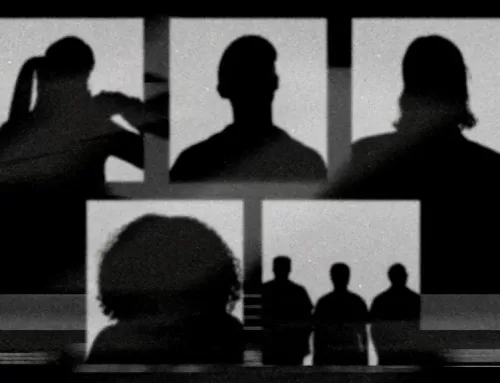

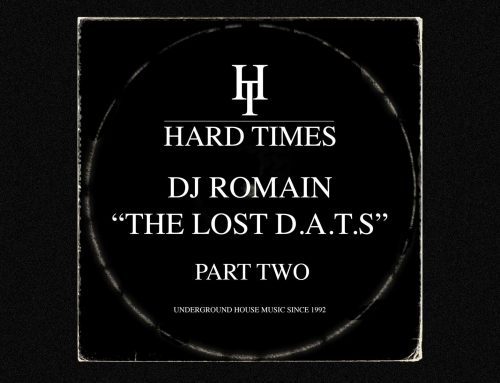

![Carl Cox says his Ibiza residency at [UNVRS] will be a “whole new world” (DJ Mag)](https://www.myhouseradio.fm/wp-content/uploads/2025/04/carl-cox-1.jpg-500x383.webp)
Leave A Comment
You must be logged in to post a comment.